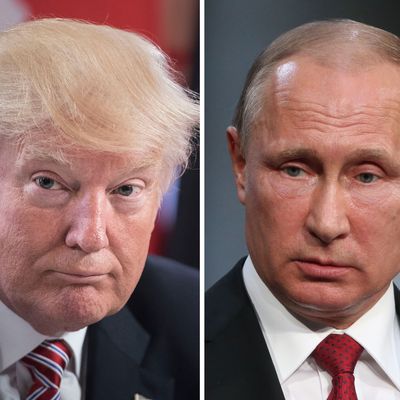
Over the last several days, the Russia scandal has taken a darker turn. Friday night, the Washington Post reported that Jared Kushner tried during the presidential transition period to set up a secret communications channel with Moscow. Tuesday morning, CNN reported that, during the 2016 campaign, Russian officials discussed having leverage of a financial nature over Trump, which could be used to manipulate the Republican nominee. The exact nature of this relationship remains as yet unknown, but its parameters have shifted. The most innocent explanations of Donald Trump’s shadowy relationship with Russia have grown increasingly fanciful, while the most paranoid interpretations have grown increasingly more plausible.
Indeed, in another one of dramatic juxtapositions that would have seemed ham-handed in a spy thriller, the latest scandalous revelations came out just as Trump could be seen carrying out what looks for all the world like his end of a pact with Moscow. If the president did have an objective on his trip to Europe — a premise that, it goes without saying, cannot be assumed — it was to crack up the American alliance with Western Europe. That happens to have been Russia’s primary diplomatic objective since the end of World War II. In Brussels, Trump refused to publicly affirm the Article 5 guarantee of the NATO charter — the foundation of the anti-Russian alliance, and the basis for Europe’s defense against Russian aggression. He directed his trademark wild diatribes against Germany, accusing it repeatedly of abusive trade relations, despite the fact that the United States does not have bilateral trade relations with that country. Amazingly, he kept up the abuse on Twitter after returning Stateside, while simultaneously defending Russia over its intervention in the American election.
The White House’s account of Kushner’s back-channel talks with Russia, as Will Saletan shrewdly points out, does not square with what the administration has said in the past, or what Russia says now. The administration claims now, via a source speaking to Fox News, that Kushner’s outreach to Russia was a “only a one-off for a call about Syria.” But when The New Yorker poked at the relationship in February, it had a different explanation: “[T]he aim, according to the White House, was to establish ‘a more open line of communication in the future.’” So, not a “one-off” at all, but an attempt to open an ongoing dialogue.
Meanwhile, the Russian account of this discussion, from March, treats it as a simple business chat related to Kushner’s role as a real-estate baron, unrelated to Syria or any aspect of Kushner’s political duties at all. “In March, Mr. Gorkov said in a statement that his December meeting with Mr. Kushner was part of the bank’s strategy to discuss promising trends and sectors with influential financial institutions in Europe, Asia and the United States,” notes the New York Times. “That statement said he met with representatives of ‘business circles of the U.S., including with the head of Kushner Companies, Jared Kushner.’ At the time, Mr. Kushner was still running the company, which is his family’s real estate business.”
Needless to say, Kushner’s curious failure to disclose these contacts when he obtained his security clearance looks more than a bit suspicious in this light. Kushner’s lawyer told Reuters Friday, “Mr Kushner participated in thousands of calls in this time period. He has no recollection of the calls as described.” If establishing a secret back channel to Vladimir Putin using Russian diplomatic facilities is such a quotidian part of Kushner’s workaday routine that he simply forgot he had done it, then he is probably much guiltier than anybody suspects.
However laughable Kushner’s defense of his undisclosed outreach to Russia, it is more believable than the administration’s response to CNN’s explosive report that Moscow believed it had leverage over Trump himself. “The reality is, a review of the president’s income from the last ten years showed he had virtually no financial ties at all,” explains a White House spokesman, by way of assuring America that the Russians have no financial leverage over their president. This “review” is a “certified letter” sent by Trump’s own lawyers. It consists entirely of their own assertion. It does not include the disclosure of Trump’s tax returns, which every other presidential candidate for decades has released, and which would prove their claim.
And, most amazingly, the defense does not even deny the Russians have leverage over Trump. Trump’s lawyers had insisted he did not owe money to Russian lenders “with a few exceptions.” The administration’s defense rewords that claim to “virtually no financial ties at all.” How big a loophole is that “virtually”? That’s for him to know and you not to find out.
To be sure, more mundane accounts for all these facts can still be sustained. Evidence for those accounts could also be seen on Trump’s overseas trip. Trump is easily manipulated by flattery, and instinctively drawn toward autocrats. His obvious warmth and comfort with the Saudis, who feted him in their palaces in a pleasantly dissent-free atmosphere, dissent being a crime punishable by death, presented an obvious contrast to his discomfort with the democratic leadership of America’s allies. Perhaps his fondness for Putin, while at odds with what was once a consensus bipartisan opposition to Russian aggression, simply reflects Trump’s natural moral instincts rather than a secret deal.
Yet the sinister explanations remain plausible, too. And increasingly so. Here is one sentence from the Post’s Friday-night bombshell that is worth thinking over: “The Post was first alerted in mid-December to the meeting by an anonymous letter, which said, among other things, that Kushner had talked to Kislyak about setting up the communications channel.”
The Post got this tip, from a source purporting to be inside the Trump transition, in December. It took until Memorial Day weekend for the newspaper to authenticate it. The small aside — “among other things” — casually tells readers that this explosive story was just one allegation in the letter. There is more to come.






























